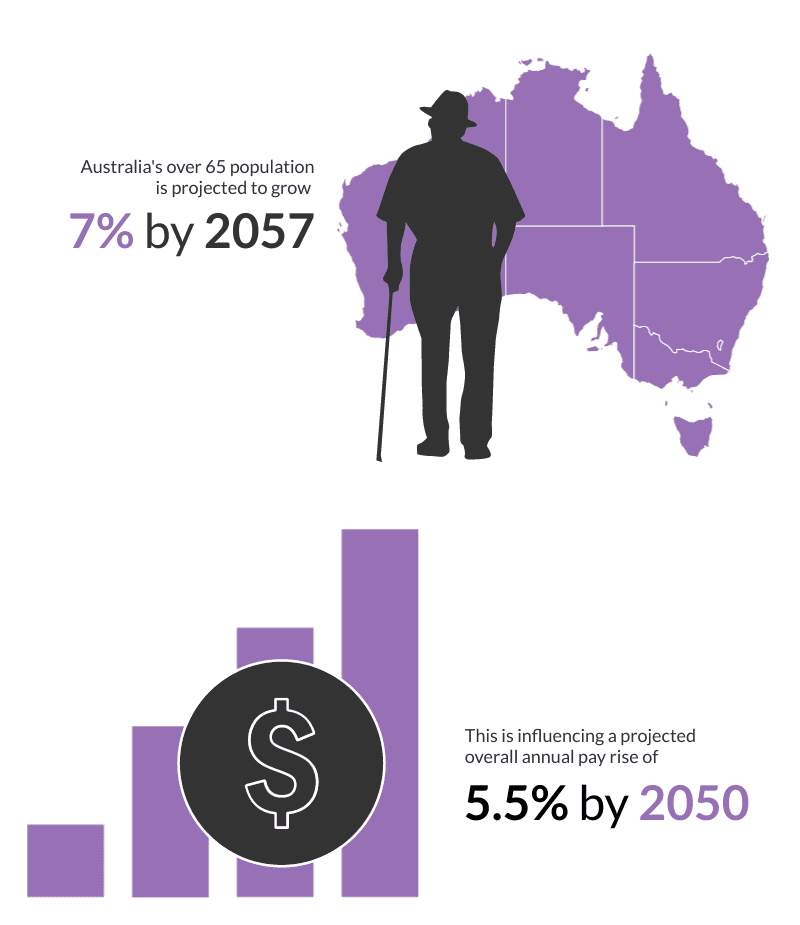7 Things to Know About a Career in Aged Care

If you’re looking for a stable caring career that keeps you engaged, offers career progression and overall fulfilment, aged care is for you.
If you’ve started considering a career in aged care, it’s time to brush up on your knowledge about the industry; your career opportunities; and training pathways to get there. In this article, we’re going to take a look at the top seven things you need to know about working in aged care and why this industry could be what you’re looking for.
1. There are many types of aged care
A career as an aged care worker can take on multiple forms, depending on what type of role you’re looking for. Some aged care workers choose to provide personal care via home visits, while others work in aged care facilities or community care services.
Common aged care roles include:
Residential support worker
Lifestyle support worker
General aged care support worker
Depending on whether you’re looking for a standard nine-to-five full-time position, a part-time role with more flexibility, or looking to go down the clinical carer route, a career as an aged care professional can offer it all.
2. Opportunities for career growth
The aged care industry offers opportunities for growth. With experience, aged care professionals can rise to senior positions such as aged care managers. Similarly, if clinical aged care interests you, there are education pathways available to become an AIN (assistant in nursing) or a fully registered aged care nurse.
Moving up to management
If you’re a natural leader and interested in the behind-the-scenes operations of aged care, progressing to become a care manager could be a future career goal! In the most senior position at a residential care facility, care managers oversee the clinical program, the staff and overall client satisfaction. This role also comes with a significant salary raise with an industry average of $110,000.
Average care manager salary
Pursuing clinical nursing
If moving into the medical healthcare industry interests you, aged care nursing could be an opportunity for career progression for you. Becoming an assistant in nursing or a registered nurse will lead you into a clinical care setting, working side by side with medical professionals in hospitals or residential care facilities. A registered nurse has an average salary of $77,154.
Average registered nurse salary
3. The industry needs you
Aged care services are becoming increasingly in demand, as Australia’s ageing population continues to rise. Our over 65 population is projected to grow 7% by 2057, influencing a predicted overall average annual salary rise of 5.5% until 2050 for aged care support workers.
This increased demand for aged care workers means an opportunity for new skilled, caring workers to begin breaking down the stigma surrounding the aged care industry in recent years. The Royal Commission inquiry into aged care reform is finally complete. The final report outlines 148 ways Australia can increase the quality of available aged care: starting with better training and staffing regulations.
The final Royal Commission report recommends that aged care workers:
Allocate a higher average of minutes per client per day (particularly in residential care)
Hold at least a Certificate III qualification
Sign a national register
Starting a career in aged care now will see you be a part of this positive shift to better quality care for workers and patients alike.
4. Some skills can’t be taught
This career pathway requires a broad range of skills. The most practical skills and training you’ll require for your next role will be covered in your chosen training pathway. However, there are some essential soft skills you’ll need that a course just can’t teach.
These skills include:
Communication
Active listening
Ability to relate and reflect with your clients
Patience
Emotional intelligence
Discretion
Ultimately, your ability to connect with your client will determine how you choose to administer care and support to best suit both their physical and mental health needs.
5. It can be challenging
Aged care isn’t an easy profession. Sometimes, it can even be challenging. Both you and your clients will have hard days where certain responsibilities or tasks will seem more demanding than usual. But, don’t let this discourage you!
Some of the most satisfying aspects of aged care are the moments you and your client overcome a hurdle together. This comes down to good communication, patience and really listening to your clients’ needs.
Challenges don’t mean impossible, and the sense of satisfaction and fulfilment both aged care workers and their clients receive make the tough days worth it.
6. New connections, every day
Although not always recognised as one, aged care is a very social job. A large part of your role will be physically assisting your clients with day to day tasks, however, the social aspect is equally important.
Social interaction and human connection are vital to our mental wellbeing. So, it’s integral that aged care workers encourage and reciprocate social efforts instigated by their clients.
For example, encouraging more outings from the client, or inviting friends over to your client’s own home are two great ways to facilitate good social and mental health.
All clients will choose to approach this aspect of the client-carer relationship differently. Whether it be through reminiscing on past adventures or accompanying them on new ones. How you administer emotional support through daily activities is a big part of this career.
7. Training pathways galore
Most aged care support workers choose to complete a Certificate III in Individual Support or Certificate IV in Ageing Support. These qualifications ensure you’ll have the basic skills and knowledge to start your career in the aged care sector. These pathways are offered both online or in-person by RTOs (registered training organisations), allowing flexibility for their students. They usually take between 12-14 months to complete and may require you to complete placement training.
If you choose to complete at least a Certificate III qualification, you’ll find most aged care roles will be well within reach — especially considering the new Royal Commission industry recommendations.
If you choose to move into a managerial role, you may need to upskill via further study. Similarly, if you decide to go down the nursing pathway, registered nurses must complete a Bachelor’s of Nursing.
There are various pathways available to get a foot in the door of this rewarding industry — no experience required.
If a career in aged care is starting to look promising, it’s important to understand what will be required of you! Learn more about aged care work by learning about the skills and responsibilities of these frontline health workers.
This guide is your go-to source for information on the Australian aged care industry. Here you’ll find all the resources you need to start your career: from figuring out how to hone the right skills, to planning a pathway that suits you.

